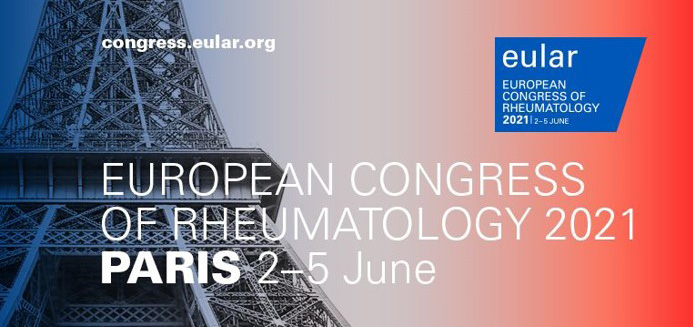Fall 2021 (Volume 31, Number 3)
EULAR 2021 Report
By Philip A. Baer, MDCM, FRCPC, FACR
Download PDF

After a full pandemic year, EULAR returned for 2021
again as a virtual
e-Congress, instead of occurring
physically in Paris. The platform was noticeably improved
from 2020, when the conversion from a live to a
virtual congress occurred suddenly and unexpectedly. I
found the platform stable, with excellent audio and video,
even when thousands of participants attended a live session.
Navigating between posters was sometimes difficult,
and while some posters could be downloaded via QR codes,
many others could not. PDFs of the slides for invited lectures
would also be an excellent addition for future virtual
congresses.
Being based in North America meant some early mornings,
but the live events compensated by ending in the
early afternoon, with most available for ad hoc playback
thereafter. A full roster of events catered to allied health
professionals, pediatric rheumatologists, and patients with
rheumatic diseases. While I did not find the industry exhibits,
there was a full roster of industry-sponsored symposia
running in parallel. There were also EULAR trivia games
based on knowledge and speed of responses. I tried one
and placed seventh, which unexpectedly provided a prize
of a EULAR textbook.
I found many presentations focused on safety, though
there were no updates on the ORAL Surveillance study
which made news earlier in the year. Integrated safety studies
on janus kinase (JAK) inhibitors were prominent, as
was another instalment of the JAKPOT multi-country registry
study, also focused on JAK safety. There were many
abstracts on the flavours du jour: COVID-19 and virtual
medicine. New GRAPPA recommendations on psoriatic
arthritis (PsA) therapy were welcome, now including eight
domains. The PsA arena continues to feature novel therapies,
from more IL-17 and IL-23 inhibitors to the first
of the tyrosine kinase (TYK) inhibitors, deucravacitinib. One hopes the brand name will be easier
to pronounce. Axial disease in PsA
remains an area of interest regarding
both definition and response to therapy,
and differences from axial spondyloarthritis
(SpA).
Lupus advances were also in the
news, including the focus on LLDAS
(lupus low disease activity state) as a target for those who
cannot reach remission. Further details of studies of belimumab
and voclosporin in lupus nephritis were presented.
In rheumatoid arthritis (RA), foci included biosimilars,
cardiovascular disease, and comorbidities, including
fatigue and mood disorders. Difficult-to-treat RA is
another trending topic. Presentations on gout, fibromyalgia,
osteoporosis and osteoarthritis rounded out the
usual suspects.
Weird science candidates included a negative study on
fecal microbiota transplantation as a treatment for psoriatic
arthritis (OP0010, also mentioned in the closing clinical
highlights session), and a study on the benefits of
Argentinean tango practice for patients with inflammatory
rheumatic diseases (POS1475-HPR). Oddly, that study was
conducted in France!
Another oddity: slides showing a red camera icon (don’t
photograph) or a green camera icon (OK to photograph).
Those red icons were often ignored in the days of live meetings;
with the ease of taking screenshots while on any virtual
platform, they seem pointless.
For those who prefer summaries of current practice,
there were a series of WIN (What Is New) and HOT (How
To Treat) lectures spanning the gamut of rheumatology topics,
delivered by experts on the various topics.
Despite the lack of Parisian tourist attractions, French
food, and in-person interactions, and perhaps because jet
lag was not an issue, EULAR 2021 was a winning event. The
hope is that in-person EULAR meetings will resume in June
2022 at the Bella Centre in Copenhagen, though a virtual
component is likely here to stay.
Philip A. Baer, MDCM, FRCPC, FACR
Editor-in-chief, CRAJ
Scarborough, Ontario
|
